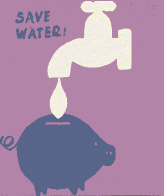
The average person in the UK uses around 150-200 litres of water every day in the home, and only 5-10 of these litres are for basic survival – food preparation and drinking. The rest we choose to use to make our lives more comfortable. One-third of our expensively treated water is simply flushed straight down the toilet. Here are some ideas which will help you reduce your home water consumption.
NEW We have recently updated this article adding many more water saving tips than the original 10 Ways to Save Water for a total of 55 tips. Many thanks to all those who emailed us their suggestions over the last 6 years which we have added below.
Water Saving Tips
Put a bottle filled with sand, or a Hippo / Bog-Hog bag into old style toilet cisterns. This water displacement reduces the amount of water you flush down the toilet. (Do not use a brick as it will slowly break down and fill your cistern with gritty sediment.)
Replace old style toilets with the latest low volume dual flush water saving toilets.
Check if your toilet cistern is slowly leaking into the bowl – put some food colouring into the cistern and if the water in the bowl changes colour without being flushed, repair or replace your toilet.
Don’t use toilets as waste bins – use a waste bin.
Don’t use a hose pipe to wash the car. Use a bucket and sponge, or use a commercial car wash that recycles the water it uses.
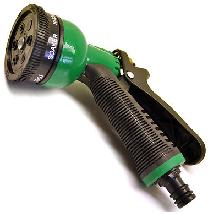
Fit a pistol grip nozzle on your hose pipe so water only comes out where and when you need it.
Use a watering can instead of a hose when possible.
Water plants and the lawn in the evening so that the water has a chance to soak in overnight. If you water in the day time, most of the water will evaporate before it has done any good.
Rake and aerate the lawn every year so that water gets down to the roots of the grass instead of sitting on a hard matted surface and evaporating off.
It is better to water the lawn well every 3-5 days rather than a little bit every day.
Wash fruit and vegetables in a bowl instead of under a running tap and pour the saved water on the garden.
Water house plants or garden plants with the water you have used to boil vegetables instead of pouring it down the sink (after leaving it to cool first).
Don’t water the garden on very windy days as it will evaporate off rapidly instead of soaking into the ground.
Steam vegetables instead of boiling. They will be more nutritious and you will use less water and less electricity or gas to cook them.
Water the garden with porous pipe or drip irrigation to get the water right to the roots of the plants and eliminate losses from evaporation.
Do planting in the spring or autumn when there is more rain and so you will need to water the plants less to get them established.
Fit a water butt on the downpipes from your guttering to collect water which can be used for garden watering and car washing.
Install a Rainwater Toilet Flushing system to use collected rainwater or Greywater.
When filling the bath put the plug in immediately and adjust the temperature as it fills rather than waiting to get the water coming out of the tap to the right temperature.
Bathe young children together.
Take a shower instead of a bath and you will use half as much water.
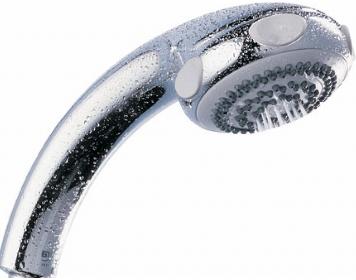
Replace your shower head with a water efficient version.
Turn the shower off while you are soaping up to save water and soap.
Put a bucket in the shower while it is getting up to temperature, and use the collected water in the garden.
Take shorter showers.
Don’t leave the tap running while you clean your teeth or shave. If you leave the tap running you could be wasting up to 10 litres per minute.
Only run your washing machine and dishwasher when you have a full load.
Select the shortest cycle on your washing machine.
When you come to replace domestic appliances, try and purchase water saving models.
Repair dripping taps. One drop per second is a waste of up to 3000 gallons per year, and can often be avoided with a new washer costing pennies. Also make sure to check any garden taps for leaks and dripping too.
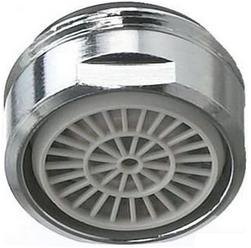
Fit low flow water saving aerators into your taps to reduce your water usage without noticing any difference.
Store tap water in a bottle in the fridge rather than running the water every time you want a cold drink.
Fit insulation around all of the hot water pipes in your home so that you do not have to run the tap long to get hot water.
Collect rainwater in a water butt and use it for watering the garden.
Lift the blade on your lawnmower so that the grass is cut an inch or two longer so that its roots are shaded and retain water.
When doing the washing up, put all the soapy things to one side until everything is washed, then fill the sink and rinse everything in that instead of running the tap constantly.
Soak dirty pots, pans, and plates to soften up the stuck on food before washing so you need less water (and effort) to get them clean.
If you have garden sprinklers to water your lawn or plants, position them so that no water lands on areas that do not need watering such as paths.
Water plants less regularly so that they grow deeper root systems which will be more drought resistant in the future.
Only use sprinklers on large areas which require watering – for everything else water by hand to reduce waste.
Check the weather forecast before watering the garden. If it is going to rain in the next day or two don’t water.
Replace your lawn with ground cover plants and shrubs native to your region and tolerant of your soil type as they will have evolved to thrive without any watering in your local climate.
Arrange plants close together so that their foliage shades the ground and slows down evaporation of moisture from the soil.
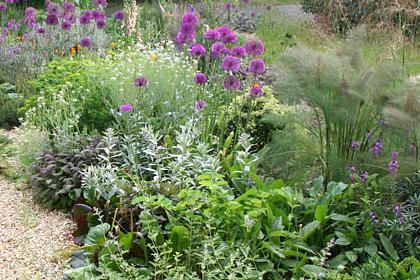
Plant drought resistant plants in a group together so you do not water them when you water the groups of more thirsty plants.
Put a good layer of organic mulch around plants to help them retain water better and require less watering. It will also add nutrients to the soil for the plants.
If you have a fish tank, the water you replace when you clean the tank is full of nutrients and will be excellent nitrogen/phosphorous rich fertiliser for your garden.
Don’t overly fertilise plants as it will increase their need for water.
Wash pets in the garden so the water is used twice.
Eat less meat and dairy foods. Raising livestock requires huge amounts of water, far more than used growing crops. It takes 2,400 litres of water to make a beefburger and 200 litres of water for one glass of milk.
Reduce food waste. Producing food uses a lot of water, and thowing away food is also wasteful. One tomato in the supermarket has 13 litres of water embedded in its production, and an apple 60 litres.
If you do not already have a water meter installed, request one. It is a great incentive to use less water if your efforts will also save you money.
If you have a water meter, monitor it and your water bills regularly so you can see exactly how much water you are using.
Immediately inform your water supplier if you see any water leaks from pipes outside or on the street. 3 billion litres is lost in the UK per day because of leaking pipes!
Turn the water off to your house when you go away on holiday in case you have any hidden leaks or a tap starts dripping while you are absent.
Use a broom to sweep your driveway, paths, and patios, instead of hosing down with water.